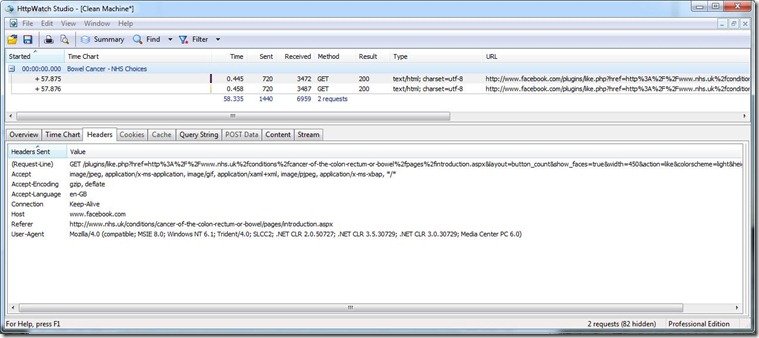Gov2.0 and Facebook ‘Like’ Buttons
I am all for Gov2.0. I think that it can genuinely make a difference and help bring public sector organisations and people closer together and give them new ways of working. However, with it comes responsibility, the public sector needs to understand what it is signing its users up for.
In my post Insurers use social networking sites to identify risky clients last week I mentioned that NHS Choices was using a Facebook ‘Like’ button on its pages and this potentially allows Facebook to track what its users were doing on the site. I have been reading a couple of posts on ‘Mischa’s ramblings on the interweb’ who unearthed this issue here and here and digging into this a bit further to see for myself, and to be honest I really did not realise how invasive these social widgets can be.
Many services that government and public sector organisations offer are sensitive and personal. When browsing through public sector web portals I do not expect that other organisations are going to be able to track my visit – especially organisations such as Facebook which I use to interact with friends, family and colleagues.
This issue has now been raised by Tom Watson MP, and the response from the Department of Health on this issue of Facebook is:
“Facebook capturing data from sites like NHS Choices is a result of Facebook’s own system. When users sign up to Facebook they agree Facebook can gather information on their web use. NHS Choices privacy policy, which is on the homepage of the site, makes this clear.”
"We advise that people log out of Facebook properly, not just close the window, to ensure no inadvertent data transfer.”
I think this response is wrong on a number of different levels. Firstly at a personal level, when I browse the UK National Health Service web portal to read about health conditions I do not expect them to allow other companies to track that visit; I don't really care what anybody's privacy policy states, I don't expect the NHS to allow Facebook to track my browsing habits on the NHS web site.
Secondly, I would suggest that the statement “Facebook capturing data from sites like NHS Choices is a result of Facebook’s own system” is wrong. Facebook being able to capture data from sites like NHS Choices is a result of NHS Choices adding Facebook's functionality to their site.
Finally, I don't believe that the "We advise that people log out of Facebook properly, not just close the window, to ensure no inadvertent data transfer.” is technically correct.
(Sorry to non-technical users but it is about to a bit techy…)
I created a clean Virtual Machine and installed HTTPWatch so I could see the traffic in my browser when I load an NHS Choices page. This machine has never been to Facebook, and definitely never logged into it. When I visit the NHS Choices page on bowel cancer the following call is made to Facebook:
So Facebook knows someone has gone to the above page, but does not know who.
Now go Facebook and log-in without ticking the ‘Keep logged in’ checkbox and the following cookie is deposited on my machine with the following 2 fields in it: (added xxxxxxxx to mask the my unique id)
- datr: s07-TP6GxxxxxxxxkOOWvveg
- lu: RgfhxpMiJ4xxxxxxxxWqW9lQ
If I now close my browser and go back to Facebook, it does not log me in - but it knows who I am as my email address is pre-filled.
Now head over back to https://www.nhs.uk/conditions/cancer-of-the-colon-rectum-or-bowel/pages/introduction.aspx and when the Facebook page is contacted the cookie is sent to them with the data:
- datr: s07-TP6GxxxxxxxxkOOWvveg
- lu: RgfhxpMiJ4xxxxxxxxWqW9lQ
So even if I am not logged into Facebook, and even if I do not click on the ‘Like’ button, the NHS Choices site is allowing Facebook to track me.
Sorry, I don't think that is acceptable.
Comments
- Anonymous
December 07, 2010
Thanks for bringing this up again, and linking to my blog. Without wanting to pick on facebook the whole time, the "add this" button is pretty intrusive too. May write-up what they get up to. I think the key issue is that the NHS and their manner of hiding behind their privacy policy annexed with their comment re: logging out. Once again thanks, I feel you have managed to raise all of these issues in your post. FWIW, I am still yet to get any response from the NHS, and am getting to the point where I am going to complain to the ICO. Thanks for your support! Mischa

